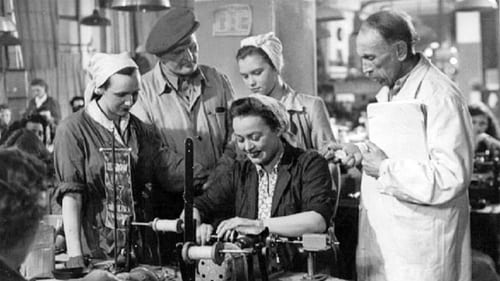István Pásztor
出生 : 1916-03-20, Budapest, Hungary
死亡 : 1974-06-05

Director of Photography
In a little town named Lombos, suddenly a smelly, sulphonic thermal water gush out. Félix Szombathy, a swindler sees a great business opportunity in this. He founded a fraud company and promised to revive the town.

Director of Photography
PFC Molnár decides his WWII services are over, and with serious money hidden in his hand grenades, he heads to an abandoned mansion where he encounters not only the sour butler but a bunch of others who also try to wimp out of their duties.

Director of Photography
1920 in a mining town in the country-side. The team of children led by Ferkó Boda fish guns and a flag of Red soldiers out of the local lake.

Director of Photography

Director of Photography
The spring of 1919. Karikás Frigyes reorganises brigade 39 at the Tisza. His most devoted soldiers are Korbély János and his followers, who remain faithful to the political commissioner under all circumstances.

Director of Photography
Kölyök, this lovely, ham-handed young woman, has caused many a trouble already in the Dunaújváros Iron Works. Fortunately, however, the manager does not want to give her up, what is more, Kölyök found a second father even at the police.

Director of Photography
In 1944, Feri Margittai escapes from the front, but his mother sends him away from home.

Director of Photography
Cabinet crisis threatens in Futbólia, due to a series of lost matches. The head of state charges admiral Duca with the task, as a last chance, to get hold of the football star of the Hungarian team presently playing in Switzerland.

Director of Photography
This easy-to-take Hungarian drama is also known as Two Wishes. The prinicipal characters are a pair of juvenile delinquents, who may still be redeemable. The sullen duo is befriended by a kindly police inspector, who takes it upon himself to straighten out the boys. What follows cannot be termed surprsingly or innovative, though it is immensely satisfying. Of interest is the fact that a Communist-bloc film would admit to a delinquency problem in the so-called Worker's Paradise. Ket Vallomas was the Hungarian entry in the 1957 Cannes Film Festival.

Director of Photography
Nagy István, the formerly poor peasant boy returns to his native village as a teacher. His conviction is that the abyss between rich and poor can be diminished by good will. The rich Böröcz Horváth Klári returns his love, and also Böröcz Horváth is willing to help the poorest family, the Bakos. Bakos Jóska, who was sent to serve the tough Böröcz Horváth as a payment, dies of an infected wound and the people in the village hold the teacher liable as well. Nagy István realises, that the abyss cannot be ceased, what is more, it is impassable. He breaks up with his fiancée and stands by the side of the poor.

Camera Technician
György Dandin, the rich bourgeois concludes a marriage contract with the noblemen Lükeházy couple who has turned poor: he can marry their daughter in return of a regular financial contribution. Angyalka escapes the undesired husband at their very first night, and furthermore she establishes a secret romantic relationship with Count Klitander who suits her a lot better.

Director of Photography
Imre, secretary of the illegal communist party arrives in Budapest secretly in 1942, in order to start the newspaper of the party in the fight against war. Not even his own mother can see him.

Director of Photography
Liliomfi is a 1954 Hungarian comedy film directed by Károly Makk. It was entered into the 1955 Cannes Film Festival. Set in the "Golden Era" of the wandering Hungarian theatre troupes. Mariska and Liliomfi fall in love without suspecting that Mariska's foster father, Professor Szilvay, is also Liliomfi's uncle. Soon the couple must contend with the professor's plan to make Liliomfi give up his "unrespectable" profession of acting by exposing the professor's hypocrisy, greed, and tyrannical selfishness.

Director of Photography
Venice Film Festival 1954

Director of Photography
1952. The workers who have performed the reconstruction of the bridges are now needed at the construction works of the underground railway. During admission they are diluted with elements of doubtful fame and many of them are in a bad mood for the wages, too.

Director of Photography











